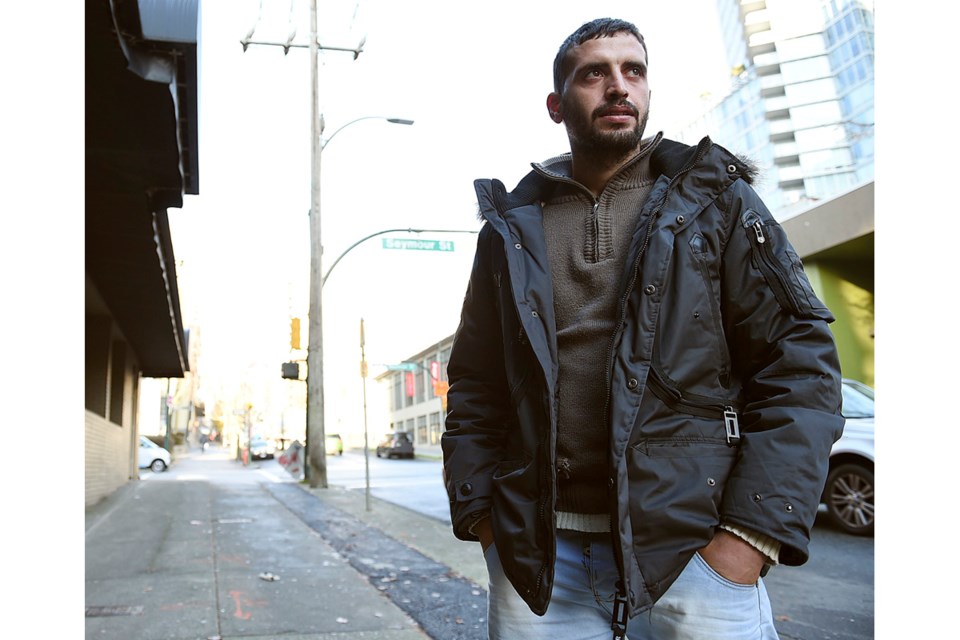Issa Alwadi arrived in Vancouver just last week. He has barely adjusted to life in a temporary home downtown with his wife and baby, and he speaks hardly a word of English, but he wanted the people of his newly adopted country to hear first-hand about what is happening in Syria.
His case worker at the Immigrant Services Society of B.C. suggested he wait a few weeks or even months before telling his story, but he was determined. He wants Canadians to understand the misery Syrian people are experiencing in what is left of his country and in the refugee camps of the nearby nations.
The numbers are familiar and horrific. Somewhere between 220,000 and 340,000 Syrians have been killed in the multi-sided war. From a population smaller than Canada’s — about 23 million — there are nearly eight million internally displaced persons and four million refugees have fled the country. The fighting is sectarian, between branches of Islam, geopolitical — a proxy war involving the West, Russia, Iran and Iraq — and also embroils the ethnically distinct Kurdish minority and the forces for a democratic Syria that initially took up the fight against Syrian president Bashar al-Assad’s regime.
(Although Alwadi’s first name is the Arabic for Jesus, he is a Muslim.)
Alwadi is fortunate to be among the millions of refugees. He came very close to being among the dead.
Telling his story through his Arabic-speaking case worker at the Immigrant Services Society, Alwadi acknowledges that he opposes the regime of Bashar al-Assad, the Syrian dictator whose attempts to crush his country’s version of the Arab Spring has created one of the worst humanitarian disasters in history. In the early days of the so-called Damascus Spring, Alwadi was one of thousands who took to the streets in peaceful protest.
“We marched and we were holding olive branches,” says the 23-year-old. “But from that point I was not involved in anything.”
When the crackdown came, Alwadi was among the countless arrested by the regime. His arrest, he says, had nothing to do with any involvement on his part in anti-government violence.
“It’s to plant the seed of fear in the hearts of Syrians to avoid any possible protest,” he says.
He was beaten and spent a month, he says, in a room of maybe five-by-five metres with about 300 people.
“It was almost impossible to sleep,” he says. “Some people died because of the pressure and suffocation.”
He was interrogated and tortured. The regime tried to get him and other prisoners to admit to “crimes,” to agitating against the government and to committing acts of violence.
“But those statements are false,” says Alwadi. He was never involved in violence, he says. He was studying IT and was just about to write his first-year final exams when he was arrested.
After a month crammed with hundreds of others in a small room, he says, he was moved to a facility where things were worse. Government agents shot randomly into the crowds of prisoners and threw grenades. Alwadi still has shrapnel in his leg.
After eight months and 20 days, the Free Syrian Army liberated the survivors in the prison. Alwadi received some treatment for his injuries and then fled, like so many others, across the border into Jordan.
While he may have been safe from the repression of the Assad regime and the fighting between the dozens of belligerent militias, the plight of refugees in Jordan, he wants Canadians to understand, is untenable.
“The situation in Jordan for Syrians is catastrophic,” he says. “In certain camps it’s sometimes impossible to survive in them.” Where Alwadi was, he had to walk about a kilometre just to access potable water.
He spent two-and-a-half years in Jordan, during which time he married, before being accepted as a refugee to Canada. Alwadi, like a majority of the 25,000 refugees Canada is committed to taking in by February, is sponsored by the federal government but, as next week’s column will demonstrate, religious groups and other Canadians are clamoring to privately sponsor thousands as well.
“I’m more rested now,” he says, though his eyes suggest otherwise, “but it’s still a new country.”
What he knew about Canada before he arrived here a week ago Tuesday was enough to convince him to make the move and bring his family here.
“I knew that I would have my freedom, that I would be treated like a human,” he says. “And I heard that this was a beautiful country.”
He wants to reassure Canadians who fear that the Syrian refugees might include radicalized individuals, adding with a laugh that he doesn’t want to fight anybody.
“I would like to have a normal life,” says Alwadi. “I would like to have a job, I would like to work, I would like to eat, I would like to send my kids to school.”
He also wants to spread awareness about the unknown numbers of people who are still in the prisons of Syria.
“They are forgotten,” he says. “They are innocent and nobody talks about that issue, but it’s a humanitarian issue.”
Alwadi’s story is one of millions of tragic personal histories, although for him and his family, hope is beginning to look possible.
Next week: What are the values driving Canadians of all religious backgrounds to come to the aid of these people from half a world away?
@Pat604Johnson



